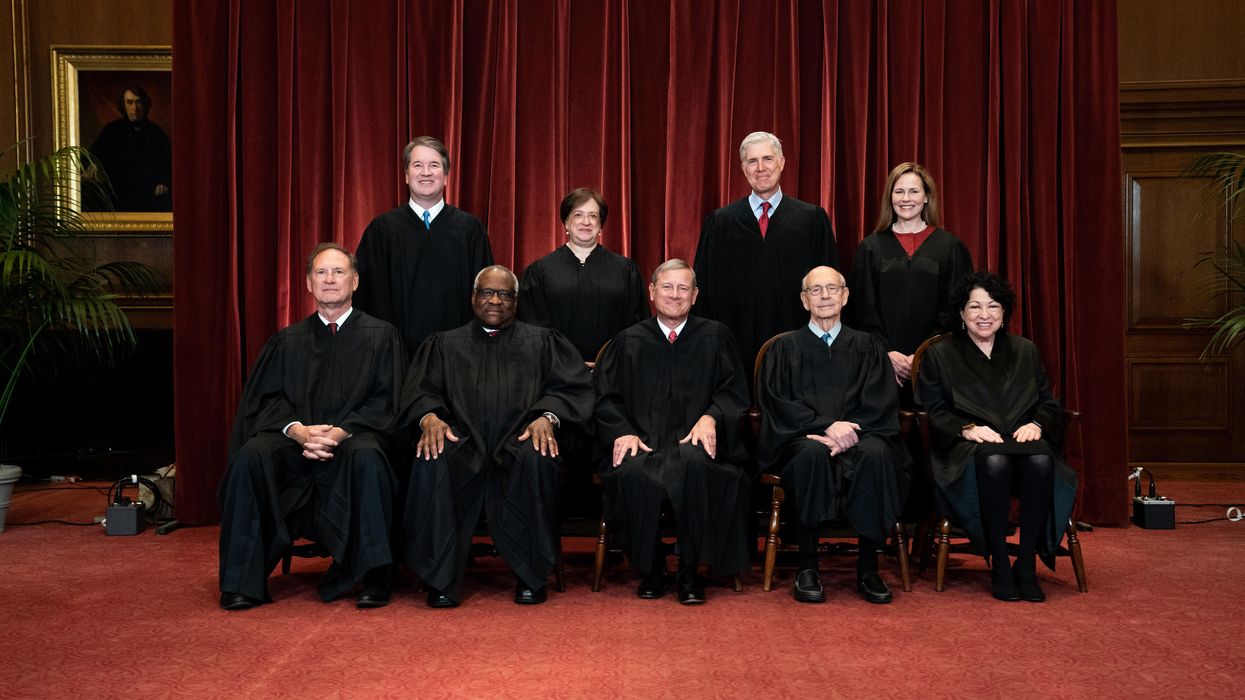Jonah Goldberg is editor-in-chief of The Dispatch and the host of The Remnant podcast. His Twitter handle is @JonahDispatch.
Conventional wisdom suggests that the Supreme Court, like the country, is deeply divided along partisan and ideological lines. But this overlooks the court's historic recent run of unanimous decisions and the fact that the liberal and conservative justices often don't vote as blocs.
Court critics tend to respond to these inconvenient realities by saying something like, "Sure, but on the big cases, the culturally divisive ones, the conservatives form the majority and the liberals the dissenting minority."
This is obviously true sometimes. The Dobbs decision, which overturned Roe v. Wade, is a paradigmatic example. While I think Dobbs was correctly decided on the merits, it also was an important, polarizing ruling along ideological lines.
I'm happy to concede that, but why can't critics concede the reverse? When the court doesn't rule along ideological lines on important cases, they simply stop calling the cases important. As legal analyst Sarah Isgur (my colleague at the Dispatch) and economist Dean Jens recently put it in Politico, "If one defines 'important' as the most politically divisive, then it becomes circular." Which cases are divisive? The important ones. Which cases are important? The divisive ones.
Last year, the court accepted a case brought by antiabortion doctors seeking to reverse the Food and Drug Administration's relaxation of restrictions on the abortion drug mifepristone. In the wake of Dobbs, many understandably thought the case was important and divisive.
Last week, however, the Supreme Court ruled 9-0 in favor of the pro-abortion-rights position. If you listened closely, you could almost hear throngs of pro-abortion-rights court critics whispering, "Never mind."
Gun rights are another obvious example of partisan polarization. And last week, the Supreme Court issued a decision on the subject along the dreaded conservative-liberal axis. All six Republican-appointed justices voted to overturn a ban on bump stocks, which for practical purposes convert legal semiautomatic weapons into automatic weapons akin to machine guns, which have been illegal for 100 years.
The bump stock ban was imposed by the Bureau of Alcohol, Tobacco, Firearms and Explosives under then-President Trump in the wake of the monstrous 2017 mass shooting in Las Vegas. So the supposedly partisan Republican justices overturned a Republican administration's reinterpretation of the law, while the Democratic appointees voted to uphold it. It was in that sense another example of a decision that doesn't tidily fit the conventional storyline.
Still, liberal critics of the court immediately denounced the conservative majority's originalist zealotry, while right-wingers celebrated a "major win" for the Second Amendment, in the words of Texas Attorney General Ken Paxton. But the case had little to do with the Second Amendment.
Rather, the court rightly held that the Trump administration couldn't unilaterally rewrite the established meaning of a statute banning machine guns to include bump stocks. If Trump is reelected, you can imagine many liberals suddenly looking more favorably on the idea that presidents can't unilaterally rewrite the law.
Justice Samuel A. Alito Jr.'s concurrence with the majority opinion gets to the crux of the problem. Referring to the Las Vegas shooting, Alito wrote that "an event that highlights the need to amend a law does not itself change the law's meaning.
"There is a simple remedy for the disparate treatment of bump stocks and machine guns. Congress can amend the law -- and perhaps would have done so already if ATF had stuck with its earlier interpretation. Now that the situation is clear, Congress can act."
What Alito is getting at is that Congress isn't doing its job. The president is supposed to faithfully execute the law -- hence the "executive branch" -- and Congress, the legislative branch, is supposed to write the law. Both parties have colluded over decades to ignore this basic division of labor.
When the Trump administration banned bump stocks, it was responding to public pressure. But it was also protecting Republican legislators from being forced to take a hard vote in response to that public pressure.
Whether it's forgiving student loans, banning bump stocks, controlling the border or setting trade policy, Congress doesn't want the responsibility -- or the accountability -- that comes with being a legislature. So its members let the White House and the courts do their job for them, relishing the chance to gripe when they do it wrong or take credit when they do it right. This reliance on the other branches raises the stakes of presidential elections and judicial confirmations.
Yes, polarization is part of the reason for Congress' dysfunction. But Congress' dysfunction also drives polarization.
(C)2024 Tribune Content Agency, LLC.




















Trump & Hegseth gave Mark Kelly a huge 2028 gift